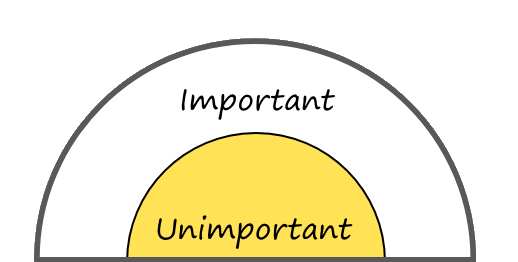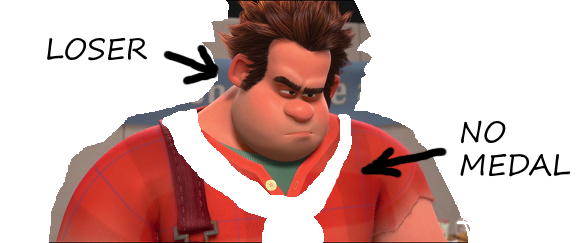What Links Here?
Outbound Links
Story Layers
I've worked out a proper grand unified theory of story telling, and it's much simpler than all the old theories.
The Search for the Grand Unified Theory of Story Telling
Some people analyze stories and say things like:
There's a plot, and there's a story. The plot is just what happens: they do this then they do that. The action is in the plot. But the story, the real story is outside of the plot: it's about the changes to the character, it's about the struggle and the feelings and the emotions."
And other people analyze stories and say things like:
There are only three (no five! no seven! no two!) stories ever told:
There's the hero's journey, the quest. There's boy meets girl. There's tragedy, there's comedy."
Or they say:
All stories are the same. A man falls in a hole. If he climbs out of the hole: it's a comedy. If he dies in the hole, it's a tragedy."
Other people say stories are an evolved social memory aid, used for conveying meaningful and potentially life-saving knowledge.
Some people say a story must have a message, and others disagree.
If you want to send a message, call Western Union
—Commonly attributed to Samuel Goldwyn, but Wiki quote says Moss Hart
I think a story's purpose is to entertain, and it does this by creating suspense.
Two Quests

Stories work by setting up two quests, an important quest and an unimportant quest. A quest, or question, creates suspense in the mind of the viewer.
The important quest is usually established first. The story is not over until the important quest is resolved.
But: 90% of the story is about the unimportant quest.
Here's an example, Wreck it Ralph.
We work out immediately that Ralph is a loser. So we establish the important quest: can Ralph stop being a loser? (We also see that there is a specific setting... this must be showcased in the opening moments)
Soon after, Ralph establishes that his quest is to get a medal. This is the unimportant quest.

90% of the action will now be dedicated to the unimportant quest. It's all a ruse. It's all a magician's trick to distract from the real quest: stop being a loser Ralph! Along the way he forms a tenuous friendship: showing some progress on the important quest.
But there's a conflict between the two quests. This is a universal constant. The inner quest (the unimportant quest) may appear to the character to be a way to resolve the outer quest (the important quest).
In order to fulfill the unimportant quest of getting a medal, he betrays his only friend. Now he's further than ever from fulfilling the important quest. Even though he got his stupid, unimportant medal.
This causes a crisis! He suddenly knows what's really important, and in real terms, the crisis leads to the possible destruction of everyone's world.
Once he knows what's really important, the story must race to its conclusion quickly.
There's some action as he races to simultaneously resolve the crisis (effectively: save the world) and to stop being a loser. Will he make it?
Crisis averted! He makes a bunch of friends, fulfilling the important quest, and now the story is over.
The difference between the important quest and the unimportant quest:
| Important Quest | Unimportant Quest |
|---|---|
| Implicit | Explicit |
| Introduced first | Introduced second |
| Internal to character | External to character |
| Subjective | Objective |
| The story is complete once it is resolved | The tension increases if it is resolved first (see note below) |
| Emotional | Physical |
| Visible to the audience | Visible to the audience |
| Invisible to the characters | Visible to the characters |
The "unimportant" quest is often "high stakes", a matter of life of death, may result in the destruction of the universe, etc. So perhaps "unimportant" is not the right way to portray it. How about, "distracting"? It's the distracting quest, that prevents them from immediately addressing the, more fundamental, pre-existing quest.
False Victory or False Defeat
Completing the unimportant quest is by itself unsatisfying. It’s a false victory.
Examples of the false victory:
- Wreck It Ralph gets his medal! Does the story end there?
- Tristan, as promised, gives a piece of stardust to Victoria. Does the story end there?
- Paul Sheldon, in Misery, finishes writing the book that Annie Wilkes has been forcing him to write. Does the story end there?
Failing to fulfil the unimportant quest is also unsatisfying — but it’s a false defeat.
Some examples of the false defeat:
- Maverick does not get the trophy at Topgun academy.
- Rocky loses to Apollo Creed.
- Mike and Sully, in Monsters University, get thrown out of the University.
The real problem was there all along
Someone has a huge problem they're unaware of. They are distracted by an obvious problem. The obvious problem leads to more and more sub problems. And then one of two things happens:
Either:
- by solving the obvious problem they become aware of the original problem and solve both. Or:
- their attempt to solve the obvious problem reveals the real problem to them (through a crisis). They can now ignore the distraction and solve only the original problem.
The omnipresent power of the Important Quest
One fun fact about the "important quest".
In most stories, our character can turn any lesser bad guy into a good guy by appealing to the important quest.
- Luke can turn Darth Vader into a good guy with just a few words.
- Rapunzel can convert a bar-room full of rough necks into her friends by explaining her dream.
- Elwood Blues can get down on his knees, take off his glasses, and have his avenging ex girlfriend put down her machine gun and melt into his arms.
It's almost as if these characters know that there is a bigger picture than the battle they are currently engaged in (or at least their writer knows it, and knows the audience knows it)